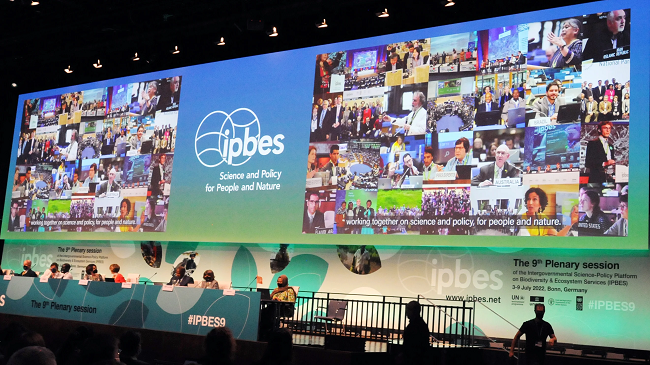How can humans use wild species sustainably? What different values do people have of nature?

Two reports by the World Biodiversity Council IPBES provide politicians with important recommendations for the protection and sustainable use of global biological diversity. They show that overexploitation of wild species is a global threat.
Taking better account of nature’s multiple values can help stop the biodiversity crisis. During the negotiations in Bonn, a new report was also launched that will deal with the connections between the economy and biodiversity.
German Environment Minister, Steffi Lemke, said: “The crisis of species extinction is the second key threat to our natural foundations of life, alongside the climate crisis. The recommendations of the World Biodiversity Council IPBES on dealing with nature are therefore immensely important in order to specifically address the causes of the biodiversity crisis: This is also evident in relation to wild animal and plant species that are threatened by overexploitation on land and in the sea.
“The new IPBES reports will also support the implementation of the new global biodiversity framework, which we urgently need, and which should finally be adopted in Montreal in December. And we must finally take action and implement it to protect our livelihoods.”
German Research Minister, Bettina Stark-Watzinger, said: “The progressive loss of biodiversity is a major challenge for science, society and politics. With advances in science and technology, we can better understand biodiversity loss and its impacts and take targeted countermeasures. To this end, the Federal Ministry of Research is taking up the recommendations of the World Biodiversity Council IPBES and is supporting them effectively through targeted international and national activities, such as the research initiative to preserve biodiversity.”
Mayor of the City of Bonn, Katja Dörner, submitted: “Cities and regions effectively protect biodiversity, create awareness and mobilize people to get involved. They can only do this if they can draw on data from scientific research. The new reports from the World Biodiversity Council IPBES, for example, show us very precisely what value biodiversity has on our doorstep in terms of health, socially and also economically. This helps us a lot in setting up local strategies in the biodiversity action programme.”
After almost a week of negotiations in Bonn, the World Biodiversity Council passed two reports. The first report deals with the sustainable use of wild species of animals, plants, fungi and algae. Their use for food, energy, medicine and materials is an essential component almost everywhere in the world. Sustainable use and stopping the overexploitation of wild species is essential to reverse the global trend of biodiversity loss. The report was requested by the Washington Convention on International Trade in Endangered Species, among others.
The second report, the so-called “Values Assessment”, shows that the values of nature are often neglected in political decisions. The World Biodiversity Council recommends taking greater account of the diversity of values and assessment methods in order to achieve global sustainability and biodiversity goals.
At the national level, the value of nature, ecosystems and their services were illustrated, for example, by “Natural Capital Germany – TEEB DE”, a project funded by the German Ministry for the Environment (BMUV). The German Federal Statistical Office has already started to collect such data in the so-called ecosystem accounts for the whole of the country. Projects for the appreciation and protection of biodiversity in politics,
Over the past few years, more than 80 leading international experts from dozens of countries, including Germany, have contributed to the two IPBES reports.
The World Biodiversity Council also discussed a planned report that will look at the links between business and biodiversity. On the one hand, this will shed light on the dependencies of economic actors on nature and, on the other hand, the effects of economic activities on species and ecosystems. The report is scheduled for adoption in 2025.
The World Biodiversity Council IPBES (Intergovernmental Science-Policy Platform on Biodiversity and Ecosystem Services) is an intergovernmental body for scientific policy advice on the topic of biological diversity and ecosystem services. It was founded in 2012. 139 countries (including Germany) are currently members of IPBES.
The committee collects scientific data from all over the world, analyses it and shows political options for action to protect biological diversity. IPBES received particular attention in May 2019 with the global report on the state of biodiversity and ecosystem services (“Global Assessment”). Among other things, the report warns that a million species could become extinct within the next few decades if humans continue as before.
Germany is one of the largest financiers and home country of the World Biodiversity Council. The Secretariat is located in Bonn, along with 25 other United Nations institutions. The BMUV and the German Ministry for Research (BMBF) jointly set up the German IPBES coordination office in 2014 to support, among other things, the participation of German experts in the IPBES assessments.
